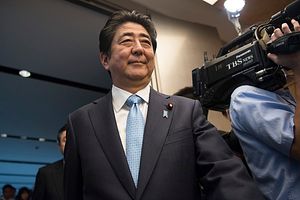On Wednesday, Japanese Prime Minister Shinzo Abe will leave for Iran in what will be the first visit to the country by a sitting Japanese prime minister in 41 years. Abe is slated to meet with Iranian President Hassan Rouhani as well as Supreme Leader Ali Khamenei.
His trip comes at a critical time for the Joint Comprehensive Plan of Action (JCPOA), a 2015 agreement on Iran’s civil nuclear program between Tehran and a group of six world powers (not including Japan). Since the United States’ withdrawal from the JCPOA and reimposition of sanctions on Iran last year, the agreement has been slowly unraveling. Last month, Rouhani said Iran would move toward surpassing limits on heavy water and low-enriched uranium enforced by the agreement. The announcement was the most serious sign that Iran, deprived of the economic benefits it was meant to receive under the agreement by the United States’ decision to violate the agreement last year, would cease complying.
Japan’s interests in Iran’s global economic reintegration following the passage of the JCPOA in 2015 were clear. Tokyo, as a heavy importer of energy from the Persian Gulf, would have benefited massively. Japan also maintains a normal diplomatic relationship with Iran and, while Tokyo isn’t a party to the JCPOA, the bilateral relationship provides Abe with an important avenue to encourage Tehran’s continued compliance with the agreement.
That indeed appears to be the top objective for Abe’s trip. As Japan’s Chief Cabinet Secretary Yoshihide Suga noted on Tuesday, “Amid rising tensions in the Middle East, we plan to encourage Iran, a regional power, to move toward easing tensions at the top leaders’ meetings.”
Abe’s ability to position himself as an honest broker, however, will be limited by the simple fact that Japan is a U.S. treaty ally. Less than two weeks ago, Abe hosted U.S. President Donald J. Trump in Tokyo for an official visit. The two leaders have discussed Iran.
In Iran, Abe may not serve as a broker, but as a messenger. Trump has indicated in recent weeks that instead of continuing to raise tensions with the Iranian regime, he would be amenable to an open-ended bout of diplomacy with the Iranian leadership, building on the model he pursued with North Korean leader Kim Jong Un. Abe could signal the U.S. president’s seriousness about such a proposal. “If they’d (Iran) like to talk, we’d like to talk also,” Trump had said in Tokyo after discussing Iran with Abe.
Japan stands to benefit if Tehran and Washington can walk back their tensions. While a return to the JCPOA by the United States is unlikely at this point, Abe may see even a small probability of the United States reversing the sanctions on Iranian oil exports imposed last November as valuable. Japanese refiners ceased imports of Iranian oil in March after the expiry of a one-time waiver granted to Tokyo by the Trump administration. (Alongside China, India, South Korea, Taiwan, Italy, Greece, and Turkey, Japan had received a waiver from the United States.)
Abe’s chances at walking away from Tehran with a major diplomatic coup are slim given Japan’s limitations in the ongoing tussle over the future of JCPOA as a nonparty to the agreement, but there’s a real chance that the Japanese prime minister may be able to provide a useful vector to stand down simmering tensions between Washington and Tehran. The worst Abe can do, in the meantime, is leave Tehran having changed nothing.

































